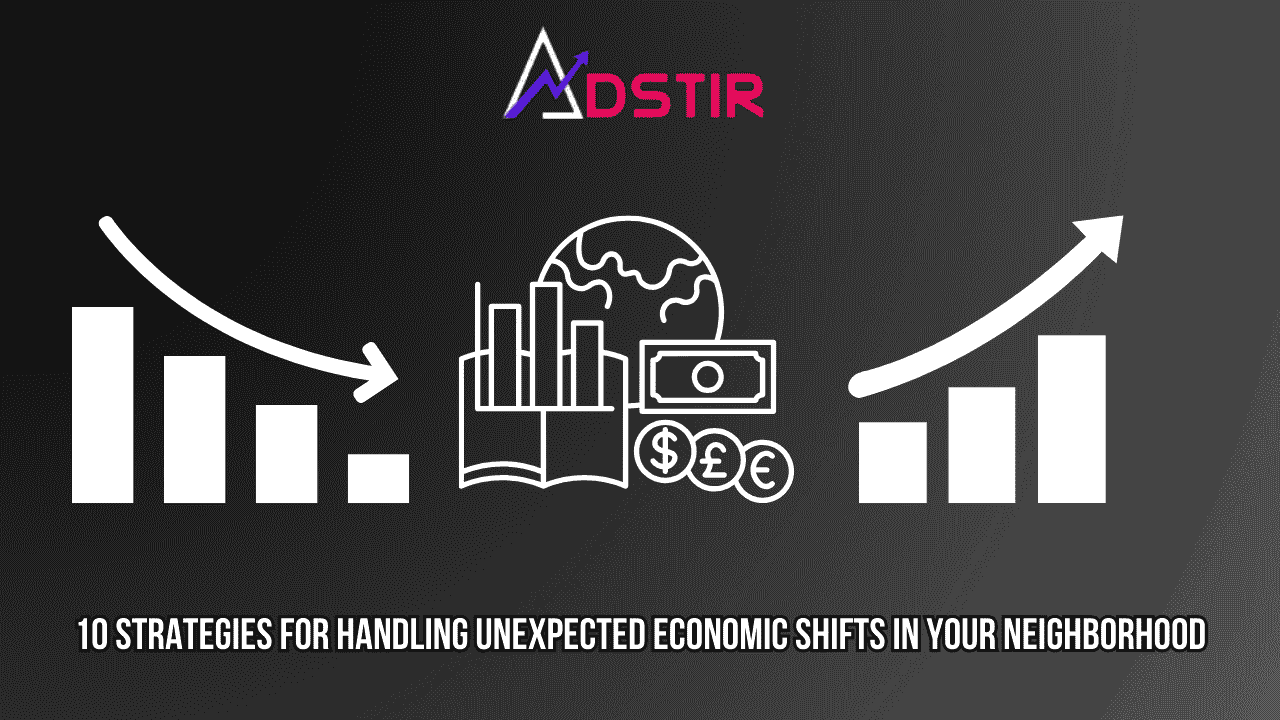10 Strategies for Handling Unexpected Economic Shifts in Your Neighborhood – Economic shifts can happen suddenly and impact communities in ways that are difficult to predict. Whether caused by inflation, job losses, business closures, or global financial downturns, these changes can create uncertainty for residents and business owners alike. A neighborhood that was once thriving may experience a downturn, affecting employment, housing, and local businesses. While these shifts can be challenging, communities that take proactive steps can better manage economic disruptions and even turn them into opportunities for growth. Here are some key strategies to help handle unexpected economic shifts in your neighborhood.
Understanding Local Economic Trends
The first step in managing an economic shift is understanding the trends affecting your neighborhood. Paying attention to job markets, real estate conditions, and business closures can provide insights into potential changes. Attending community meetings, engaging with local leaders, and following news about economic developments can help residents stay informed and prepare for upcoming challenges.
Supporting Local Businesses
One of the biggest impacts of economic shifts is seen in small businesses. When the local economy struggles, businesses often face declining sales and may be forced to close. Supporting local businesses by shopping within the community, using their services, and encouraging others to do the same can help maintain stability. Neighborhood initiatives that promote local shopping or incentives for small businesses can also make a significant difference in keeping them afloat.
Strengthening Community Networks
A strong community network can be a vital resource during times of economic instability. Neighbors who work together and support one another can share resources, offer assistance, and provide job opportunities within their networks. Organizing community meetings, forming support groups, and creating neighborhood-based social media groups can strengthen the ties among residents and build a more resilient community.
Encouraging Workforce Development
Job loss is a common consequence of economic downturns, making workforce development a crucial strategy. Encouraging residents to acquire new skills, seek further education, or explore different career paths can help them adapt to economic changes. Local government programs, online courses, and community education centers often provide resources that can assist individuals in improving their job prospects.
Promoting Financial Literacy
Economic instability can create financial stress for individuals and families. Promoting financial literacy within the neighborhood can help residents make informed decisions about budgeting, saving, and managing debt. Hosting financial workshops, sharing online resources, and encouraging responsible financial habits can improve economic resilience and prepare people for unexpected downturns.
Strengthening Public Services and Infrastructure
Public services and infrastructure play a critical role in stabilizing a neighborhood during economic shifts. Ensuring access to reliable public transportation, healthcare, and educational resources can help support residents in difficult times. Advocating for government funding, collaborating with nonprofits, and organizing community service initiatives can contribute to maintaining these essential services even in times of economic uncertainty.
Encouraging Homegrown Entrepreneurship
When jobs become scarce, entrepreneurship can offer a viable alternative for income generation. Encouraging residents to start small businesses or side hustles can help sustain the local economy. Community workshops on business planning, marketing, and financial management can provide aspiring entrepreneurs with the tools they need to succeed. Establishing local investment groups or cooperative business initiatives can also help entrepreneurs secure the funding necessary to launch their ventures.
Adapting Real Estate Strategies
Fluctuations in the housing market can significantly impact a neighborhood’s economic stability. Whether property values rise or decline, residents should be prepared to adapt their real estate strategies accordingly. Homeowners may need to consider refinancing options, while renters may need to negotiate leases or explore more affordable housing options. Local governments can assist by implementing housing policies that protect tenants and homeowners during economic downturns.
Encouraging Sustainable Practices
Sustainability efforts can help neighborhoods reduce costs and become more self-sufficient during economic shifts. Initiatives such as community gardens, renewable energy projects, and resource-sharing programs can lower expenses for residents and businesses alike. Encouraging energy-efficient home improvements and waste reduction programs can also contribute to long-term economic stability.
Seeking Government and Nonprofit Assistance
Many government agencies and nonprofit organizations offer financial aid, job training, and social services during economic downturns. Residents and business owners should be aware of available grants, loans, and assistance programs that can provide temporary relief. Community leaders can play a key role in spreading awareness and helping residents access these resources when needed.
FAQs
1. How can I tell if my neighborhood is experiencing an economic shift?
Look for signs such as increased unemployment, rising housing vacancies, business closures, or a decline in public services. Attending community meetings and reading local news can also provide valuable insights.
2. What can I do if I lose my job due to economic changes?
Consider learning new skills, applying for government assistance programs, or exploring freelance and entrepreneurial opportunities. Networking with others in your community can also help you find job leads.
3. How can local businesses survive an economic downturn?
Businesses should focus on adapting their strategies, cutting unnecessary costs, and seeking community support. Participating in local business networks and accessing government aid can also help them stay afloat.
4. How can I make my neighborhood more resilient to economic changes?
Building strong community ties, supporting local businesses, advocating for public services, and encouraging financial literacy are key ways to enhance economic resilience.
5. What are some resources for individuals struggling financially during an economic shift?
Government aid programs, nonprofit organizations, local food banks, workforce training centers, and financial counseling services are valuable resources for those in need.
Conclusion
Economic shifts can be challenging, but neighborhoods that take proactive measures can minimize the negative effects and even create opportunities for growth. By supporting local businesses, strengthening community networks, encouraging workforce development, and promoting financial literacy, residents can build resilience against economic downturns. Adaptability and collaboration are key to overcoming economic challenges, ensuring that neighborhoods remain strong, stable, and prosperous no matter what changes come their way.
Also Read: How to Secure Visa-Sponsored Jobs in the US, UK, and Canada
